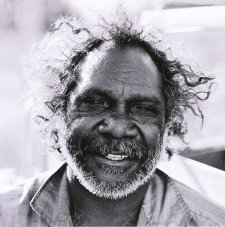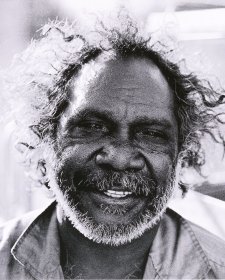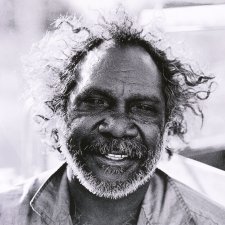- About us
- Support the Gallery
- Venue hire
- Publications
- Research library
- Organisation chart
- Employment
- Contact us
- Make a booking
- Onsite programs
- Online programs
- School visit information
- Learning resources
- Little Darlings
- Professional learning
Philip Gudthaykudthay (1935-2022), Liyagalawumirr (Yolngu) bark painter, worked as a young man as a stockman, fencer and crocodile hunter around Milingimbi and Ramingining. He started painting in the 1960s, taught by his half-brother Mirritja (Manbarra), selling his work through the Milingimbi mission. His paintings typically centre on his mother’s group’s imagery, particularly the tuber called munyigani, or on the landscape grid of his own country, from the stories of which he derives his nickname, ‘Pussycat’. He had his first solo exhibition at the Garry Anderson Gallery in Sydney in 1983; a few years later, he contributed several lorrkon to the National Gallery’s Aboriginal Memorial. In the 1990s he was included in a number of major group exhibitions including the international show Aratjara (1993-4), Power of the Land (1994) at the National Gallery of Victoria and The Painters of the Wagilag Sisters Story at the National Gallery of Australia in 1997. His work is held in most major Australian collections. Gudthaykudthay played the Sorcerer in the Rolf de Heer film Ten Canoes (2006), conceived by de Heer and David Gulpilil, which was filmed in traditional lands and featured descendants of hunters who were photographed by anthropologist Donald Thompson in the 1930s.
Purchased 2005
© Martin van der Wal



On one level The Companion talks about the most famous and frontline Australians, but on another it tells us about ourselves.



Djon Mundine OAM brings poignant memory and context to Martin van der Wal’s 1986 portrait photographs of storied Aboriginal artists.



Visit us, learn with us, support us or work with us! Here’s a range of information about planning your visit, our history and more!